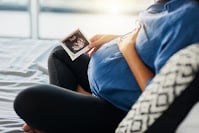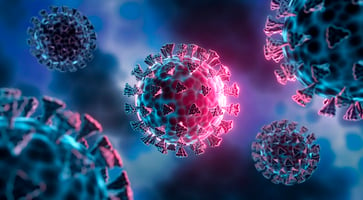Prenatal Exposure to COVID-19 Associated With Neurodevelopmental Disorders in First Year

Infants born to mothers who tested positive for SARS-CoV-2 while pregnant were more likely to be diagnosed with a neurodevelopmental disorder within the first 12 months of life, even after accounting for preterm birth, according to a study published today in JAMA Network Open.
“Our findings identifying an association between prenatal SARS-CoV-2 exposure and neurodevelopmental diagnoses at 12 months are consistent with a large body of literature including human and animal studies linking maternal viral infection and maternal immune activation with offspring neurodevelopmental disorders later in life, some of which can be foreshadowed as early as the first year of life,” wrote Andrea Edlow, M.D., M.Sc., of Massachusetts General Hospital and colleagues.
Edlow and colleagues analyzed electronic health records for 7,772 live births that occurred between March and September 2020 at two academic medical centers and six community hospitals. They identified mothers who tested positive for SARS-CoV-2 during pregnancy and whose offspring were diagnosed with at least one neurodevelopmental disorder within the first 12 months of life. Maternal and offspring records were matched using the Electronic Data Warehouse based on date and time of birth, medical record number, and the offspring’s sex. Neurodevelopmental disorders included developmental disorder of motor function, expressive language disorder, developmental disorder of speech and language, phonological disorder, and unspecified disorders of psychological development.
About 3% of the mothers tested positive for SARS-CoV-2 during pregnancy. These mothers were significantly more likely to give birth before their due dates than unexposed mothers (14.4% vs 8.7%). Over 6% of their offspring received a neurodevelopmental diagnosis within 12 months, compared with 3% of unexposed offspring. After adjusting for preterm birth, offspring of exposed mothers were still more likely to be diagnosed with a neurodevelopmental disorder than unexposed offspring. SARS-CoV-2 infection during the mother’s third trimester was particularly associated with neurodevelopmental disorders in offspring. The majority of neurodevelopmental diagnoses included developmental disorders of motor function or speech and language.
In an accompanying commentary, Torri Metz, M.D., M.S., of the Division of Maternal-Fetal Medicine at the University of Utah Health considered the possibility that the adverse childhood outcomes identified by the study were caused by the virus itself or by societal changes and the stresses that the COVID-19 pandemic caused. “These preliminary data are critically important, yet many questions remain,” Metz wrote. For example, she noted that Edlow’s study does not look at later variants of COVID-19, which may have a different impact on children exposed to the virus during pregnancy.
Metz commented that it is not surprising that the pandemic and exposure to COVID-19 may be linked to neurodevelopmental problems in young children. “As a retrospective cohort study, this publication by Edlow et al can only demonstrate associations, and causality cannot be determined,” Metz continued. “Perhaps the most important question is how do we intervene to help mitigate the adverse effects of the pandemic on young children?”
For related information, see the Psychiatric News article “COVID-19’s Impact on Development Remains Unclear.”
(Image: iStock/Adene Sanchez)
Don't miss out! To learn about newly posted articles in Psychiatric News, please sign up here.






